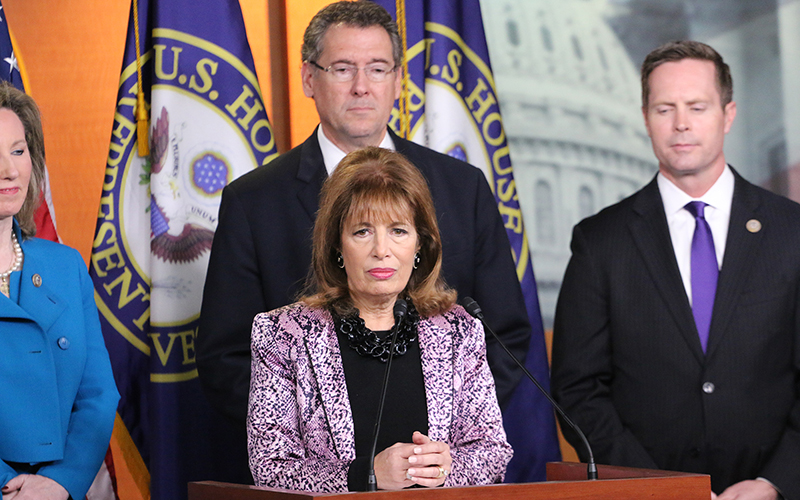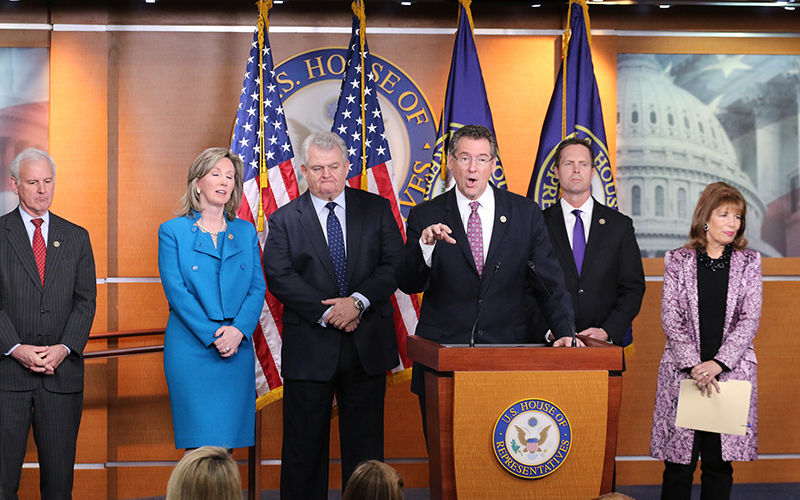WASHINGTON – The House gave final approval Tuesday to measures aimed at protecting congressional workers from sexual harassment and making it easier for them to come forward if they feel they have been victimized.
The fast-track, voice-vote approval came one week after Senate approval of the measures, which followed a wave of harassment allegations in Congress that led to the abrupt resignation in December of Rep. Trent Franks, R-Glendale, among others.
It also comes less than a week after Arizona legislators expelled state Rep. Don Shooter, R-Yuma, over harassment charges.
The bipartisan bills – which some were calling the #MeToo Congress Act – would require that every House office adopt a new anti-harassment policy and would establish an Office of Employee Advocacy to provide legal consultation for workers who come forward with allegations.
The bills also do away with settlement payments by the Office of Compliance, which paid out more than $17 million to settle 264 claims for a variety of workplace violations between 1997 and 2017. From now on, investigations will be conducted by the new Office of Congressional Workplace Rights and lawmakers will be personally on the hook for any Treasury funds used for a settlement on their behalf.
Rep. Raul Grijalva, D-Tucson, said Tuesday’s vote “demonstrates a commitment to holding members of Congress and congressional staff to the highest standard when confronting sexual harassment.”
“I hope this legislation will provide victims of sexual harassment with access to the resources they need to pursue justice and will hold everyone accountable for their actions – no matter their position of power,” Grijalva said in a statement from his office. “Each of these victims deserves the opportunity to seek justice and have their voice heard, and this legislation is an important first step toward making their pursuit a reality.”
The measures would also eliminate a mandatory 30-day counseling requirement for those who come forward. Workers would still have that option, but could also go directly to an investigation.
“It was a system that protected the harasser and did little to serve to the victim- but that all changes now. The victim is the person we support most,” said Rep. Jackie Speier, D-California, one of the prime sponsors of the change. “If anyone thinks you are getting away with sexual harassment, we have a big awakening for you. You will pay personally and you will also pay the price financially.”
Carly Mee, a staff attorney who provides direct assistance to sexual assault survivors through the nonprofit organization SurvJustice, said she is optimistic about the bills’ improved legal benefits.
-Cronkite News video by Austen Bundy
“One of the most important elements of the legislation is granting the employee who comes forward immediate legal representation,” said Mee, noting that workers previously faced the 30-day “cooling off” period, during which they could not request a hearing or file a lawsuit if they refused to settle.
“When you grant the employee more direct involvement with legal consultation and mediations, you begin to accurately balance the power dynamic,” Mee said.
Angela Rose, founder of the nonprofit Promoting Awareness Victim Empowerment (PAVE), said the bipartisan legislation “sets a powerful precedent” for how sexual violence cases are handled at a federal level.
“Having a bipartisan structure that is effective in combating sexual harassment with legal representation not only helps raise awareness for victims, but also greatly impacts the healing process for them,” Rose said. “It’s validating their stories and taking victims seriously, not just prolonging their legal battles.”
Franks resigned Dec. 8, shortly after the House Ethics Committee confirmed it would investigate allegations that he had discussed with female staffers the possibility that they might act as surrogate mothers for him and his wife, among other charges.
It was part of a wave of allegations that also led to the resignations of Sen. Al Franken, D-Minnesota, and Rep. John Conyers, D-Michigan, and led several other members to announce they will not seek re-election this fall.
Shooter was expelled Thursday on a 56-3 vote after an 11-week investigation into charges of sexual harassment found he had “created a hostile working environment for his colleagues and those before the legislature.”
The changes approved by Congress would have no effect on the state level and would not affect Franks retroactively.
One of the changes is a requirement that the Office of Compliance perform a “climate survey” of congressional employees every two years to evaluate workplace hostility. But Rose said she wishes it also included mandatory training for employees told about allegations in confidence, since a successful claim “directly correlates with the reaction of the first person they told.”
“Offices need to clearly define consent as not being the absence of a no, but the overwhelming presence of a yes,” Rose said. “When a coworker hears an allegation from someone, they need to be trained to respond in a manner that doesn’t invalidate the employee who told them.”
But lawmakers were pleased with the bills that will provide “more transparency, accountability, and stronger protections for employees,” according to a statement from Rep. Gregg Harper, R-Mississippi, chairman of the House Administration Committee.
“We can now proudly say #MeToo Congress,” Speier said.

